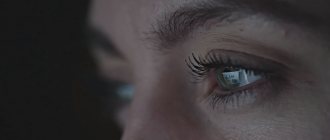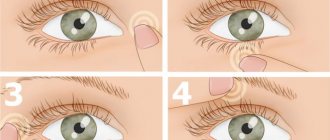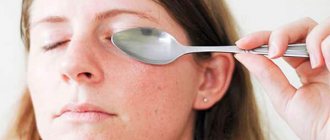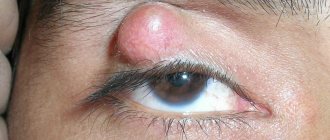The bright time of waiting for a baby can be overshadowed by unpleasant syndromes. Often pregnant women experience eye twitching. It can last from a couple of seconds to several minutes. Even if this unpleasant illness is outwardly invisible, the expectant mother begins to worry about the causes of tic.
Share
Tweet
Share
Cool
Send
Causes and characteristics of teak
The causes of tic can be both diseases and organic factors.
ATTENTION. If a tic occurs, you should immediately consult a doctor, because A tic may be a symptom of a central nervous system disorder. In rare cases, a tic can cause a brain tumor.
The most common causes of tics:
- emotional overload;
- lack of nutrients in the body;
- stress;
- anxiety states.
Organic causes of tic:
- previous encephalitis;
- traumatic brain injuries;
- Tourette's syndrome;
- overdose of antipsychotic drugs.
REFERENCE. A nervous tic is an unconscious, monotonous small tremor of the muscles of the head, neck, face, and rarely the muscles of the torso.
Why does the eyelid twitch in pregnant women?
During pregnancy, the entire hormonal balance changes. The body begins to live a new life, taking into account the bearing of the baby. Due to these changes and the emotional state of the expectant mother, a nervous tic may appear.
The reason may also be that the mother’s body “shares” magnesium, potassium and calcium with the child, so a deficiency of these elements may occur. In this case, muscle cramps, pain in the lumbar region, headaches, chronic fatigue, and memory impairment will be added to the nervous tic. The tic will go away if you compensate for the lack of microelements in the body.
Expert opinion
Nosova Yulia Vladimirovna
Ophthalmologist of the highest category. Candidate of Medical Sciences.
During pregnancy, a woman is subject to a double burden: ordinary household and work responsibilities plus carrying a child, with all the ensuing inconveniences. The body gives useful microelements to the baby for its healthy growth and formation, sleep and nutrition are disrupted, nausea and vomiting occur, the load on the back and legs increases, and swelling appears. Against this background, sleep patterns are disrupted, and as a result, problems with the nervous system arise. In this case, a nervous tic may appear.
Also, the cause of nervous tics in pregnant women can be:
- metabolic failure;
- increased muscle tone and contractility;
- increased visual load;
- nervous breakdowns, fears and worries;
- diseases of the visual organs;
- inflammatory processes of facial nerves, injuries;
- brain contusions, concussions, lesions;
- inflammation and infections of the nasopharynx, vestibular apparatus and middle ear;
- diseases of the cardiovascular system, hypertension, vegetative-vascular dystonia;
- allergic reactions;
- chronic diseases of internal organs, systems, muscles, joints and bones.
ATTENTION. It is important for the expectant mother and baby to sleep 8 hours a day. You can adjust your sleep patterns with the help of relaxation, physiotherapy, and visiting a neurologist.
How to cope with the disease
If your eye does not twitch often or for a long period of time, you can try to deal with the problem yourself. The main method of treatment will be relaxation. Here you can recommend relaxing baths, auto-training, and walks in the fresh air. If anxiety and suspiciousness do not go away, you should visit a psychologist.
What else you can do yourself:
- Limit working at a computer monitor and watching TV shows. Walking in nature, attending concerts and exhibitions, and meeting friends will provide the necessary emotions.
- Eliminate all situations that may cause stress. For example, stop communicating with unpleasant people.
- Get enough sleep. You need to go to bed no later than 10 pm and get at least seven hours of sleep.
If these methods do not help, you should consult your doctor. He will prescribe herbal-based relaxing drugs, for example, Persen or valerian tincture. As well as vitamin and mineral complexes that will help compensate for the lack of essential microelements that are beneficial for the eyes. The doctor may recommend acupuncture and physical therapy.
The most suitable options for the latter:
- massage of the face and neck-collar area;
- relaxing cosmetic masks;
- balneotherapy (baths with sea salt).
Your doctor may also recommend drops and exercises to prevent eye fatigue. You can try eye exercises before visiting an ophthalmologist. For example, with a spasm of the eyelid, you can blink quickly. Or rub your palms together, and then apply them to your eyelids, as if transferring heat energy.
When twitching, you can gently massage the eyelid in a circular motion. Such manipulations will not harm a pregnant woman.
Prevention
To prevent the development of nervous tics, it is necessary to follow a special diet for pregnant women. The diet should include foods high in protein and nutrients. Special multivitamins for pregnant women help maintain the balance of substances in the body of the expectant mother and baby.
To relieve fatigue, aromatherapy with lavender oil or sachet with lavender is suitable. It is important to limit your exposure to harmful foods and drinks. If your eyes are tired, you can use moisturizing eye drops.
For the health of the central nervous system, you need to normalize your daytime (if possible) and nighttime sleep patterns.
If possible, it is better to reduce the amount of physical and mental stress and eliminate stress.
Of course, it is necessary to consult a doctor in a timely manner if the nervous tic intensifies.
Useful video
Why does the eye twitch?
What to do if your eye twitches during pregnancy?
The main thing is to relieve anxiety. For these purposes, you can take a walk in the fresh air, do auto-training, or take herbal baths, but only with the permission of a doctor. In addition, limit work with a computer monitor during pregnancy and try to protect yourself from unpleasant sensations and people.
If the twitching does not stop, the doctor may prescribe valerian tincture or a multivitamin complex. Sometimes acupuncture or physiotherapy helps, for example:
- massage of the collar area of the neck, face;
- warming face masks;
- baths using salty sea water.
An ophthalmologist may recommend eye exercises if they begin to twitch, or special drops to reduce fatigue, for example:
- "Inoxa";
- "Oxial";
- "Visomitin."
Causes of the unpleasant syndrome
The reasons why the eye periodically twitches can be different. In some cases, this is a symptom of a serious disease of the central nervous system, that is, the disease is of organic origin. Long-term treatment is required here, since tics can cause, for example, a brain tumor. But in most cases, the eye twitches due to psycho-emotional overload or a lack of certain substances in the body.
In a pregnant woman, a nervous tic may be associated with hormonal changes and mental fatigue. In addition, during pregnancy, the expectant mother experiences a lack of magnesium, potassium and calcium, which are lost to the baby.
The deficiency of the first of these elements is especially noticeable. It can be identified not only by a nervous tic, but also by accompanying symptoms.
- muscle cramps;
- lower back pain;
- migraine;
- chronic fatigue;
- memory losses.
If the causes of tics are a lack of microelements, then they disappear when they are replenished in the body.
The main reasons why the eye twitches
It's happened to all of us: your eye starts twitching for no reason, and you don't know why. Although this may bother you, it is usually nothing serious.
It may also cause you some discomfort, but in fact, the eye movements are so fast that others are unlikely to notice them.
In most cases, the cause of eyelid twitching is some household factors that you can influence. Most often the twitching lasts a few minutes, but sometimes the eye can twitch for several days.
Here are the main reasons why the eye twitches:
1. You are tired and stressed
When we are under stress, our body produces the hormone epinephrine, known as the “fight or flight” hormone. It prepares our body to deal with threatening situations. Our body reacts to this by twitching muscles or nerves, including the eyelids.
Of course, stress is part of our daily lives and cannot be completely avoided. However, you can try to reduce the amount of stress you face by finding a balance between work and leisure, meeting with friends and doing yoga or your hobbies.
2. You sleep poorly or little
Research has found a link between insufficient sleep and eye twitching. However, it is still unclear why this happens.
But until scientists find the answer to this question, the solution remains quite obvious - sleep more.
3. You drink a lot of alcohol
If you regularly drink more than the recommended amount of alcohol, you may also experience eye twitching. Alcohol puts extra strain on our body and affects the quality of our sleep, so don't be surprised if your eye starts to twitch after a big night out.
There are many reasons to limit your alcohol intake, and eye twitching may be one of them.
4. You don't limit yourself to coffee.
Caffeine is a stimulant that makes muscles and nerves more sensitive and responsive to environmental stimuli. This increases the likelihood of random twitching, which can also affect the eyes.
If you consume a lot of coffee, tea, carbonated drinks and chocolate, you may want to reconsider your habits and see if this helps you get rid of your eye twitching.
5. You have vision problems
If you constantly strain your eyes to see something, then your eyes are working harder than usual. This is a kind of stress for the eyes, which can lead to twitching.
See your doctor if you need glasses or see if your current glasses and contact lenses are right for you.
Vision problems can also arise when working at a computer for a long time or frequently using a smartphone and tablet.
Use the 20-20 rule when using gadgets. Every 20 minutes, turn away from the screen and focus on a distant object for 20 seconds or a little longer. This will reduce the fatigue that causes the twitching.
6. Your eyes are dry
Dry eyes are often experienced by those who sit at a computer a lot, take certain medications (such as antidepressants or antihistamines), wear contact lenses, and consume large amounts of alcohol and caffeine. Without moisture, your eyelids cannot work properly and are more prone to twitching.
Once you restore moisture to the surface of your eyes, you can get rid of twitching or reduce the risk of them occurring in the future.
7. You have allergies
If you have allergies, you may suffer from itchy, swollen, and watery eyes. When your eyes rub, histamine is produced in the eyelid tissue and tear film, which can cause eye twitching.
Antihistamines are often prescribed to reduce allergy symptoms, but they can sometimes lead to dry eyes, which can make the problem worse. In this case, it is better to consult a doctor for advice.
8. Your diet is unbalanced
If you are deficient in vitamin B12, vitamin D, and magnesium, your body may not function properly. Eye twitching may be one of the many symptoms you may notice, so it's best to make sure you're getting the right amount of these vitamins and minerals.
Consume more fish, seafood and dairy products, and if you are a vegetarian, foods fortified with vitamins.
Why does the eye twitch during pregnancy?
Many expectant mothers complain of eye twitching during pregnancy. This is primarily due to the fact that pregnancy is a kind of stressful period in a woman’s life, especially if this is the first child and you don’t know what to expect.
Due to hormonal changes, a pregnant woman becomes more emotional, anxious and has a lot of worries. In addition, sleep problems contribute to this.
Most often, the problem of eye twitching during pregnancy is temporary, but if it bothers you, you can consult a doctor.
What to do if your eye twitches?
The most effective way to stop an eye tic is to find out its causes and triggers. There are basic ways to deal with eye twitching:
1. Reduce caffeine
Try limiting or avoiding caffeinated drinks such as coffee and tea, as well as chocolate, for a week or two and see if the eye tics continue.
2. Avoid alcohol
Alcohol should also be limited for a while if eye twitching has become constant.
3. Get enough sleep
Try to sleep 7-8 hours a day and avoid using electronic devices before bed.
4. Moisturize your eyes
Dry eyes increase with age. Try using special drops to moisturize your eyes.
5. Drink more
Dehydration also leads to eye twitching, so drink more water.
6. Take vitamins
If your diet cannot be considered complete, try to make up for the lack of vitamins and minerals.







